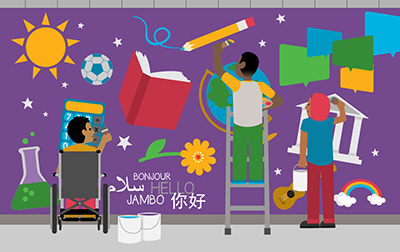Two or three really is better than one: The case for multilingualism

April is national bi/multilingual learner advocacy month. Recognizing and building upon the assets, contributions and potential of culturally and linguistically diverse children and youth is central to our work at WIDA. To honor them, I reflect on what multilingualism means to me:
- Thinking in new ways, experiencing new worlds
- Appreciating the potential and beauty of languages and cultures
- Opening doors that weren’t open before and providing opportunities that weren’t even imagined
- Building on the assets our students bring and developing new strengths so they can thrive in life, college or career
The list could go on, of course. Most recently, researchers have found cognitive benefits to being multilingual and even evidence that the onset of Alzheimer's Disease and other forms of dementia are delayed in individuals who speak more than one language (browse NPR’s 6 Potential Brain Benefits of Bilingual Education to learn more). In many aspects of life, multilingualism is an asset to individuals and to societies. As we move into the second decade of the 21st century, global trade and communication continues to grow, despite political whims and a global pandemic.
The benefits are indisputable, yet we have traditionally held a double standard with respect to multilingualism, valuing it for those students who possess economic, social or racial status, and undervaluing it in marginalized populations.
The situation with respect to promoting multilingualism seems to have gotten worse over the last decade. In public schools an unintended consequence of No Child Left Behind, the prior federal education authorization (2001‒2015), was an increased focus on basic English and mathematics, often at the expense of world languages, art, music and even science programs. At the college level, many universities reduced or eliminated world language requirements, which at best were two or three semesters – not enough to reach a fluency threshold. (Leveen, 2021*; Promising Futures, 2017**)
It doesn’t need to be this way. The good news is, as National Academy Press succinctly presented, students reach higher levels of English and perform better academically in schools that value and support their languages and cultures. Reaching high levels of literacy in English and in their own languages is a benefit for themselves and a bonus for society. For English speaking students, high school and college is too late to push multilingualism. We need more bilingual and dual language programs that begin in elementary school and are sustained in secondary programs. Only then will we reach a better place with respect to valuing multilingualism and multilingual learners. (Promising Futures, 2017)
Kathy Escamilla’s many books and articles on biliteracy development illustrate what schools can accomplish by teaching in and supporting multiple languages while creating learning environments that value and nurture all their students regardless of who they are. In today’s polarized political environment, there is reason to believe that learning in multiple languages or about languages and cultures has the potential to bring us closer together and help us better see our common humanity. In Biliteracy from the Start, Kathy provided us with a blueprint for the multilingual school of the future; just don’t forget, the future begins right now!
*Leveen, Steve, 2021. America’s Bilingual Century. Delray Beach, FL: America the Bilingual Press.
**Authors, 2017. Promoting the Educational Success of Children and Youth Learning English: Promising Futures. National Academies of Science, Engineering, and Medicine. Washington DC: National Academy Press.
About the author
Tim Boals is the founder and director of WIDA. His background includes language education, educational policy and Spanish language and literature. Tim frequently presents at international, national and regional conferences on the challenges facing multilingual learners and how schools and educators can better meet their needs.





